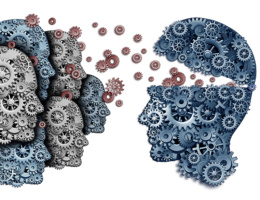Post-Partum Depression & ways to deal

What is Post-Partum Depression?
Having a baby is stressful no matter how much ever you were looking forward to it. Some degree of emotional vulnerability is natural and is expected after giving birth. This is an emotional reaction that begins a few days to a week after delivery. There are 2 forms of post-partum depression. First is known as the baby blues — If you have the blues, you would be weepy, anxious, irritable and unable to sleep. This lasts for about a couple of weeks or so wherein ample rest and a hand with the baby helps. You will feel better once the hormones level out.
However, there is amore severe form, known as postpartum major depression, which is a serious, potentially life-threatening condition. Though this starts out as baby blues but takes a more serious form of depression eventually. This should not be ignored. Post-partum depression and the baby blues share many symptoms; including mood swings, crying jags, sadness, insomnia, and irritability. The difference is that with postpartum depression, the symptoms are more severe (such as suicidal thoughts or an inability to care for your newborn) and longer lasting.
Below is a given list that may help narrow down your depression type, if you are suffering that is. However, before you make up your mind about the type of depression you have, kindly consult with your doctor.
Rare but extremely serious condition is Post-Partum Psychosis. If the mother is suffering from this then she may lose all touch with reality. This has to be treated as a medical emergency as there is an increasing chance of suicide or infanticide. Hospitalization is the best way to keep the mother and baby safe. PPP is not a gradual process but hits suddenly, usually within the first 2 weeks post-delivery.
Following are some of the symptoms of PPP
What happens if I am not treated for postpartum depression?
Ladies who aren’t treated for postpartum depression may end up have a negative effect on their children. It does not in any manner say that you are a bad mother. However, if you are con summed with irritability, apathy, low self-esteem, it is rather impossible to cater to your new born’s needs with a happy heart. Studies have shown that depressed mothers interact less with their children, which can impact the children’s later behavior. Children might also have problems performing as well on developmental tasks when compared to children of mothers who are not depressed.
Self-help for feeling better
Take Rest – Don’t miss out on sleep. Poor sleep makes depression more over bearing, so do whatever is necessary for take ample rest.
Quality Me-Time – It is OK to relax and take a break from mommy duties. Be realistic about how much you can actually take on, and talk with your partner for the required support.
Take Care of our ‘outsides’ – Frivolous as it may sound; sometimes taking care of your physical self helps you better inside. For example a long bubble bath, a head massage, tiny amount of retail therapy
Find Friends – Join a mothers group for support. You would be surprised to learn that there are so many other mothers who are in the same boat as you are.
Eat healthy diet – Do not skip meals. Depression kicks in more when you are empty stomached. Your diet is equally important as the baby’s. Establish healthy eating habits.
Exercise/Meditate – No need to overdo but ease back into exercising/meditation. Small walks in the morning or evening will boost your endorphin levels which in turn will elevate your mood.
- team_itemmom
- January 20, 2016
- 0 Comment









